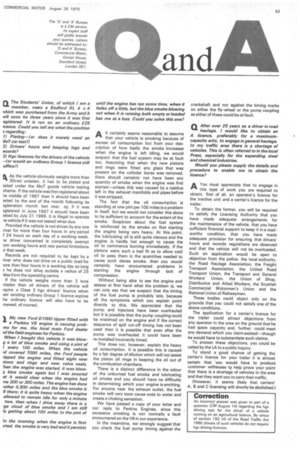My new Ford D1000 tipper fitted with a Perkins V8
Page 55

If you've noticed an error in this article please click here to report it so we can fix it.
engine is causing probms for me, the local main Ford dealer id the field engineer for Perkins.
When I bought this vehicle it was blow g a lot of blue smoke and using a pint of I every 100 miles. When the vehicle id covered 7000 miles, the Ford people ripped the engine and fitted eight new stons and rings and new valve seals. 'hen the engine was started, it was blow blue smoke again but 1 was assured at it would clear when the engine had me 200 or 300 miles. The engine has done 'other 6,500 miles and the blue smoke is 11 there; it is quite heavy when the engine allowed to remain idle for only a minute two, then when I drive away there is a -ge cloud of blue smoke and I am still ly getting about 100 miles to the pint of fn the morning when the engine is first riled, the smoke is very bad and it persists until the engine has run some time, when it fades off a little, but the blue smoke blowing out when it is running both empty or loaded has me at a loss. Could you solve this one?
A It certainly seems reasonable to assume
that your vehicle is smoking because of excess oil consumption but from your description of how badly the smoke increases when the engine is left idling, we would suspect that the fuel system may be at fault too. Assuming that when the new pistons and rings were fitted any glaze that was present on the cylinder bores was removed, there should certainly not have been any quantity of smoke when the engine was first started—unless this was caused by a residue left in the exhaust manifolds and pipes before it was stripped.
The fact that the oil consumption is standing at one pint per 100 miles is a problem in itself, but we would not consider this alone to be sufficient to account for the extent of the smoke. Suspicion about the fuel system is reinforced by the smoke on first starting the engine being very heavy. At this point, the lubricating oil is still quite viscous and the engine is hardly hot enough to cause the oil to commence burning immediately. If the pistons were such a bad fit as to allow cold oil to pass them in the quantities needed to cause such dense smoke, then you would certainly have encountered problems in starting the engine through lack of compression.
Without being able to see the engine and assess at first hand what the problem is, we can only say that we suspect that the timing of the fuel pump is probably late, because all the symptoms which you explain point directly to this. We appreciate that the pump and injectors have been overhauled but it is possible that the pump coupling could be mistimed on the engine and if the correct sequence of spill cut-off timing has not been used then it is possible that even after the pump was overhauled it could have been re-installed incorrectly timed.
This does not, however, explain the heavy oil consumption. It is possible this is caused by a fair degree of dilution which will not assist the piston oil rings in keeping the oil out of the combustion chambers.
There is a distinct difference in the odour of the unburned fuel smoke and lubricating oil smoke and you should have no difficulty in determining which your engine is emitting. For anyone near the exhaust outlet, the fuel smoke will very soon cause eyes to water and create a choking sensation.
We have passed a copy of your letter and our reply to Perkins Engines, since this excessive smoking is not normally a fault encountered on the V8 in our experience.
In the meantime, we strongly suggest that you check the fuel pump timing against the crankshaft and not against the timing marks on either the fly-wheel or the pump coupling as either of these could be at fault.
































































































